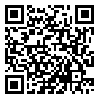Volume 28 - Supplementary
IBJ 2024, 28 - Supplementary: 339-339 |
Back to browse issues page
Download citation:
BibTeX | RIS | EndNote | Medlars | ProCite | Reference Manager | RefWorks
Send citation to:



BibTeX | RIS | EndNote | Medlars | ProCite | Reference Manager | RefWorks
Send citation to:
Nawzad Fadhel A, M. Othman S, Muhammed Hamood R, Amanj Hussein L, Othman Abdullah M, Muhsin Hasan E, et al . Dietary Patterns and Nutritional Knowledge Among Primary School Students in Erbil City. IBJ 2024; 28 :339-339
URL: http://ibj.pasteur.ac.ir/article-1-4776-en.html
URL: http://ibj.pasteur.ac.ir/article-1-4776-en.html
Abdulrahman Nawzad Fadhel 
 , Samir M. Othman *
, Samir M. Othman * 
 , Rawan Muhammed Hamood
, Rawan Muhammed Hamood 
 , Lala Amanj Hussein
, Lala Amanj Hussein 
 , Muhammed Othman Abdullah
, Muhammed Othman Abdullah 
 , Eman Muhsin Hasan
, Eman Muhsin Hasan 
 , Elaf Farhan Agha
, Elaf Farhan Agha 
 , Zhila Abdulkhalq Faqe
, Zhila Abdulkhalq Faqe 


 , Samir M. Othman *
, Samir M. Othman * 
 , Rawan Muhammed Hamood
, Rawan Muhammed Hamood 
 , Lala Amanj Hussein
, Lala Amanj Hussein 
 , Muhammed Othman Abdullah
, Muhammed Othman Abdullah 
 , Eman Muhsin Hasan
, Eman Muhsin Hasan 
 , Elaf Farhan Agha
, Elaf Farhan Agha 
 , Zhila Abdulkhalq Faqe
, Zhila Abdulkhalq Faqe 

Abstract:
Introduction: Food intake is considered nutrition compared to the body’s nutritional requirements. Good nutrition is essential for maintaining good health. It is a critical determinant of physical and mental well-being; hence, any lack of balanced nutrition leads to nutrient-related diseases. The main aim of this study was to evaluate the dietary patterns and nutritional knowledge of primary school children, particularly those in the 5th and 6th grades, in Erbil City.
Methods and Materials: A descriptive cross-sectional study was conducted among 300 primary school students in the 5th and 6th grade in three private and three public schools in the Erbil governate of the Kurdistan region. The duration of the study was from September 4, 2023, until October 19, 2023. A convenience sampling method was used. The questionnaire was distributed through direct interviews and online forms, and the statistical analysis was conducted using the Statistical Package for Social Science IBM SPSS software.
Results: The majority of students (97.3%) were from inside Erbil, and more than half of the participants (61.7%) adhered to a regular schedule of consuming their three primary meals. A statistically non-significant relation was observed between knowledge about food nutrition and the constituents of a healthy diet (p = 0.477). At the same time, there was a significant relationship between the type of school lunch and its decision-maker
(p = 0.001), and a substantial portion (39%) reported that they were not knowledgeable about food nutrition.
Conclusion and Discussion: Primary school students’ eating habits and knowledge can provide valuable insights into their overall health and nutritional status. Many individuals prefer protein-rich breakfasts, such as eggs; however, cultural influences often lead them to consume carbohydrate-heavy lunches. Approximately half of the students eat three main meals each day, yet many remain unaware of dietary nutrition, particularly regarding vitamins. Some students have received nutrition education in school, which has contributed to healthier eating patterns. Interestingly, pupils who possess a better understanding of nutrition are more likely to be overweight or obese.

Methods and Materials: A descriptive cross-sectional study was conducted among 300 primary school students in the 5th and 6th grade in three private and three public schools in the Erbil governate of the Kurdistan region. The duration of the study was from September 4, 2023, until October 19, 2023. A convenience sampling method was used. The questionnaire was distributed through direct interviews and online forms, and the statistical analysis was conducted using the Statistical Package for Social Science IBM SPSS software.
Results: The majority of students (97.3%) were from inside Erbil, and more than half of the participants (61.7%) adhered to a regular schedule of consuming their three primary meals. A statistically non-significant relation was observed between knowledge about food nutrition and the constituents of a healthy diet (p = 0.477). At the same time, there was a significant relationship between the type of school lunch and its decision-maker
(p = 0.001), and a substantial portion (39%) reported that they were not knowledgeable about food nutrition.
Conclusion and Discussion: Primary school students’ eating habits and knowledge can provide valuable insights into their overall health and nutritional status. Many individuals prefer protein-rich breakfasts, such as eggs; however, cultural influences often lead them to consume carbohydrate-heavy lunches. Approximately half of the students eat three main meals each day, yet many remain unaware of dietary nutrition, particularly regarding vitamins. Some students have received nutrition education in school, which has contributed to healthier eating patterns. Interestingly, pupils who possess a better understanding of nutrition are more likely to be overweight or obese.

| Rights and permissions | |
 |
This work is licensed under a Creative Commons Attribution-NonCommercial 4.0 International License. |





.png)
